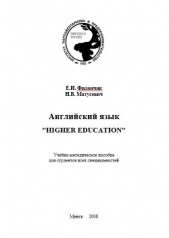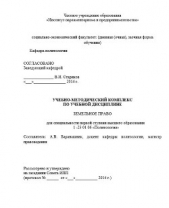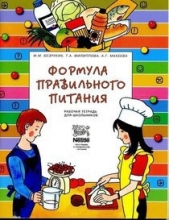Английский язык. Higher education

Английский язык. Higher education читать книгу онлайн
Настоящее учебно-методическое пособие предназначено для студентов социально-экономического факультета ИПП как дневной, так и заочной формы обучения, изучающих социокультурный и/или лингвострановедческий курс английского языка. Рассчитано на 72 часа аудиторной работы для студентов гуманитарных и экономических специальностей на дневной форме обучения, 30 часов и 10 часов соответственно для студентов гуманитарных и экономических специальностей на заочной форме обучения, что отображено в разделе 1 пособия.
Характер данного пособия определяется целью, которая ставится при обучении иностранным языкам в неязыковых вузах - углубление иноязычных знаний и формирование коммуникативных навыков и умений студента. Данное пособие призвано обеспечить студентов тематически упорядоченным языковым материалом, который может служить основой для развития и закрепления навыков, необходимых для глубокого понимания содержания иноязычного текста, анализа прочитанного, подготовки к монологической и диалогической речи, а также для письменных сообщений.
Внимание! Книга может содержать контент только для совершеннолетних. Для несовершеннолетних чтение данного контента СТРОГО ЗАПРЕЩЕНО! Если в книге присутствует наличие пропаганды ЛГБТ и другого, запрещенного контента - просьба написать на почту [email protected] для удаления материала
ACTIVITY C
VOCABULARY STUDY
PART 1
DIRECTIONS:
Match the synonymous pairs:
board
provide
academic success
an entrant
to participate
render to assistance
competition
teaching staff
council
supply
progress in studies
a school-leaver
to take part
to help
contest
educational specialists
PART II
DIRECTIONS:
Which word doesn’t suit the group?
stuff, team, classroom, collective
training, education, assistance, up-bringing
university, school, academy, institute
a lecture, an activity, a seminar, an exam
ACTIVITY D
READING COMPREHENSION
PART 1
DIRECTIONS:
Mark the statements below as ‘ True ‘ (T) or ‘ False ‘ (F)
The Belarusian specialists are much in demand in the world.
Classical and profile universities provide a three level system of higher education.
Evening form of learning is the most widespread in our country.
Belarusian teams take first places at various international competitions.
After graduation all students are provided with the first workplaces.
T
F
PART II
DIRECTIONS:
Ask 5 questions of different types to different sentences.
ACTIVITY E
ORGANIZING YOUR THOUGHTS
PART I
DIRECTIONS:
Working with a partner make some decisions about the following situation:
You are invited to the international conference concerning the development of higher education in different countries. You need to decide what to say about the system of higher education in the Republic of Belarus.
PART II
DIRECTIONS:
Working in groups discuss possible answers:
Is it easy to become a student in our Republic?
Are the Belarusian specialists really much in demand in the world? Do you think it is a positive or a negative tendency? Prepare arguments for and against.
ACTIVITY F
WRITE AND SPEAK
PART I
DIRECTIONS:
Give a summary of the text.
PART II
DIRECTIONS:
Express your opinion:
The quality of higher education in our Republic.
Only the very best students can study at budget cost.
ACTIVITY G
LISTENING COMPREHENSION:
PART I
DIRECTIONS:
Listen to the passage that will be read to you and choose the correct answers from those given below. Choose one letter only, А , В , C, or D, for each of your answers. The passage will be read to you twice with pauses on the second reading for you to select your answers.
Education has acquired a kind of snob value in modern times. We are no longer content to be honest craftsmen, skilled at our work through years of patient practice. Nowadays if we want to get a decent job, we have to have a piece of paper. If we want promotion in even the humblest job, we have to obtain a certificate or a diploma first. We may know that we would be better at the job than the man with the paper qualifications, but our experience and practical skills are regarded as relatively unimportant. 'Johnson would have been Manager by now if he'd taken the trouble to get a degree,' his colleagues say, 'he's a clever man. He could have done anything if he'd had a proper education.'
I wonder if, as time goes on, we shall discover that many people whose practical experience and ability would have been enormously useful to their employers, have been rejected on the grounds that they are insufficiently qualified. Would it not be better to allow people to become expert in the way most suited to them, rather than oblige them to follow a set course of instruction which may offer no opportunity for them to develop skills in which they would have become expert if left to themselves?
1The writer says that education
A is only valued by snobs
В is only acquired by snobs
С has become a modern form of snobbery
D has become a sign of snobbery
2If we want to get promotion nowadays we have to
A produce proof of our qualifications
В write a paper about our qualifications
С apply to take a certificate
D apply to take a diploma
3From the passage we understand that his colleagues think that Johnson
A should have been given a degree
В would have been able to get a degree
С couldn't have done anything without a degree
D wouldn't have become manager without a degree
4The writer fears that without paper qualifications many people
A won't be able to get a job
В will prove useless in their job
С will be dismissed from their job
D won't be considered for a job
5In the writer's opinion it would be better if people
A were obliged to educate themselves in their own way
В were free to become educated in their own way
С attended more practical courses
D attended courses intended for experts
ACTIVITY H
SELF-WORK:
TEXT 2
PART I
DIRECTIONS:
Translate the topical vocabulary using a dictionary:
a scholar –
capacity –
illiteracy –
campus –
significant –
to contribute –
foundation –
elimination –
ordeal –
landmark –
to sacrifice –
evidence –
creative –
facility –
to plunder –
to participate –
prominent –
staff –
PART II
DIRECTIONS: Now read .
HISTORY OF THE BELARUSIAN STATE UNIVERSITY
October 30, 1921 is the foundation date of the main educational establishment in our country – the Belarusian State University.
Academician Vladimir Ivanovich Picheta – the outstanding historian and slavist – headed the University. The first Rector united the staff consisting of scholars from Moscow, Kazan, and Kiev universities.
Rapid development of the University played a significant role in the creation of the educational system of the republic. The University’s educational and research capacity gave birth to a number of independent higher educational establishments, such as Minsk Medicine Institute, Minsk Law Institute, Minsk Pedagogical Institute, the Belarusian Institute of National Economy, Minsk Chemical and Technological Institute, which later became a part of the Polytechnic Institute. The Belarusian State University contributed much to the foundation and development of the Academy of Sciences, the Republic’s State Library and a number of large research institutions.























